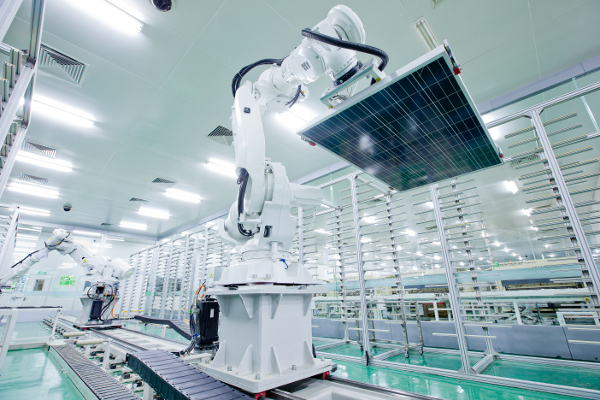From pv magazine Germany.
Jinko Solar Holdings Co. Ltd. today said it expects the U.S. International Trade Commission administrative judge responsible for inquiry 337-TA-1151 to issue an order determining it has not infringed Hanwha Q-Cells patents, within a fortnight.
Jinko said it was confident the summary determination will rule in its favor.
The investigation follows a complaint by Korean manufacturer Hanwha in March alleging infringement of a patent by Jinko. The Chinese company said today the administrative judge had interpreted the content and scope of the patent claims in September.
The judge today accepted the Chinese PV manufacturer’s request for a summary decision and suspended the hearing for an indefinite period, said Jinko.
The judge must decide whether Hanwha has presented enough facts to provide sufficient basis for a legal case. A summary decision would ensure that either the case is not heard in court or that judges would decide only in favor of the applicant, in this case Jinko.
“From the beginning we have said that Hanwha Q Cells’ complaints were without technical or legal merit, and were only meant to slow us down,” said Jinko CEO Kangping Chen. “We are very pleased with today’s order [to accept the summary decision request and suspend the hearing] which validates our position.”
No comment
Hanwha Q-Cells has not responded to pv magazine’s request for comment.
Popular content
In addition to Jinko, REC and Longi Solar have been accused by Hanwha Q-Cells of violating patents in the U.S.
In June, Jinko Solar and REC jointly filed an application for interim review of U.S. Patent No. 9,893,215 B2. The petitioners said Hanwha’s claims on the patented “method for manufacturing a solar cell with a surface-passivating dielectric double layer, and corresponding solar cell” were technically unfounded due to ‘prior art’ – evidence an invention is neither new nor “non-obvious” before the filing of patent applications. “All of these grounds are distinct from the unpatentability grounds presented in the separate IPR [inter partes review] petition filed by Longi Solar on May 13, 2019,” the companies stated at the time.
Hanwha Q Cells lodged a patent infringement lawsuit against Jinko and REC in Germany and two more against the same companies, plus Longi, in the U.S in early March. In its lawsuit, the Korean manufacturer said its rivals were using its patented solar cell passivation technology to increase the efficiency of their products.
Jinko categorically refuted the allegations and said it did not expect disruption to normal operations as a result of the lawsuit. Longi stated there was considerable uncertainty over the validity of the patents at the root of the lawsuits. REC said it intended to investigate the matter and take legal action against the Hanwha lawsuits.
In mid-March, Hanwha also brought patent litigation in Australia.
SEIA membership
The legal update from Jinko came on the same day the Chinese manufacturer was admitted to the board of directors of U.S. solar industry body the Solar Energy Industries Association.
The statement announcing the move claimed Jinko has sold more solar modules worldwide since 2016 than any other company, has deployed 7 GW of solar capacity in the U.S. and employs more than 200 workers at the module assembly facility it opened in Jacksonville, Florida last year.
This content is protected by copyright and may not be reused. If you want to cooperate with us and would like to reuse some of our content, please contact: editors@pv-magazine.com.



By submitting this form you agree to pv magazine using your data for the purposes of publishing your comment.
Your personal data will only be disclosed or otherwise transmitted to third parties for the purposes of spam filtering or if this is necessary for technical maintenance of the website. Any other transfer to third parties will not take place unless this is justified on the basis of applicable data protection regulations or if pv magazine is legally obliged to do so.
You may revoke this consent at any time with effect for the future, in which case your personal data will be deleted immediately. Otherwise, your data will be deleted if pv magazine has processed your request or the purpose of data storage is fulfilled.
Further information on data privacy can be found in our Data Protection Policy.